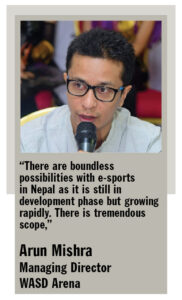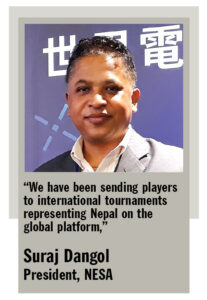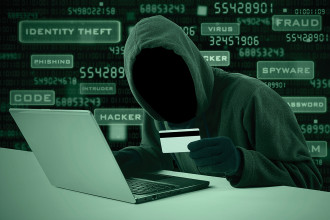
The egaming culture which had been limited to only a few enthusiasts previously has started gaining massive popularity across the world these days. In the past, egaming was seen as more of a hobby but now with serious gaming enthusiasts and large scale competitions, it has become a burgeoning business, not just globally but here in Nepal too.
According to a report published by DFC Intelligence in 2020, almost 40% of the population at present is into video games. The global gaming market is massively booming as it is gaining a lot of attention from not just youngsters but across age groups. In a recent report by Accenture, it is estimated that the value of the gaming industry is over $300 billion.
What has helped this sector expand is the easy access to computers and mobile devices and the outreach of the internet network. Esports or electronic sports has now become a major part of the gaming culture much like traditional sports. Competitions and events are organised on a global scale and take place in the form of organised, multiplayer video game competitions, particularly between professional players, individually or as teams.
Accenture estimates that esport itself is a $1.3 billion industry.
The gaming scenario in Nepal is also booming. Some of the popular games that are played professionally in Nepal are Dota 2, Counter-Strike: Global Offensive (CS:GO), Valorant, PUBG Mobile and Free Fire. However, the government has not yet formally recognised esport. To cater to the aspirations and demands of Nepalis involved in esports, the Nepal Esports Association (NESA) was established in 2016.
Suraj Dangol, President of NESA, says the organisation was formed with an aim to regulate and establish esports like other mainstream games. “We have been sending players to international tournaments representing Nepal on the global platform,” he shares, adding that to promote esports in Nepal, NESA had also organised a national level, Nepal Esport Championship, before the pandemic.

 There are now individuals who have actually taken up esports as a career. For instance, Arun Mishra is a professional Counter Strike player who has played for myRevenge Nepal team as its captain. Mishra, who has been playing the game for over a decade is also Managing Director of a Nepal-based esport company called WASD Arena. According to him, esports started to evolve from the year 2000 globally and it was in 2002 that the culture was introduced in Nepal and since then it has been only increasing with the boom in cyber culture.
WASD Arena has been actively hosting and managing tournaments for different competitive PC games like CS:GO, DOTA2 and Valorant for more than three years now. “There are boundless possibilities with esports in Nepal as it is still in development phase but growing rapidly. There is tremendous scope,” states Mishra.
Esports is not restricted to PC games only. Mobile games are also gaining massive popularity throughout the world. One of the most played games is PUBG Mobile. PUBG was released in 2018 and it took about a year for it to gain traction among the gaming community, shares Roshan Shakya, Co-leader of PN Crew, one of the first professional clans in Nepal. “We initially played the game before it was launched globally in 2018 as the Chinese version was already available but we were only able to play professionally after the game was globally launched,” he says, adding they have already participated in over 300 tournaments.
PUBG has seen explosive growth in the past few years and the competitions are far tougher with various tournaments and leagues being organised every month domestically and internationally. One of the biggest PUBG tournaments, The PUBG Mobile Global Championship 2021, will start in November with a pool prize consisting of $6 million.
Since the prize money offered by various championships is quite substantial, individuals and companies have also started investing in professional teams and have opened up companies solely dealing with the sector. One of the first registered PUBG teams of Nepal, Da Real Soldier (DRS), for instance is sponsored by various companies such as Gyapu.com, Max Tiger and The Jungle.
Sangin Bhattarai, Head of Operation of Da Real Soldier, shares they have won around $100,000 through various tournaments till date and they have been providing proper salaries and facilities to their players and staff. However, Bhattarai reveals that the government is yet to recognise esports as mainstream and they have to register their entities at the Office of Company Registrar instead of the Ministry of Youth and Sports.
Shakya also says that though esport is gaining popularity, it is still a new market in Nepal and many people are unaware about it. “But there is a lot of potential as many youngsters have started getting involved in it even viewing it as a profession.”
Read this also:
There are now individuals who have actually taken up esports as a career. For instance, Arun Mishra is a professional Counter Strike player who has played for myRevenge Nepal team as its captain. Mishra, who has been playing the game for over a decade is also Managing Director of a Nepal-based esport company called WASD Arena. According to him, esports started to evolve from the year 2000 globally and it was in 2002 that the culture was introduced in Nepal and since then it has been only increasing with the boom in cyber culture.
WASD Arena has been actively hosting and managing tournaments for different competitive PC games like CS:GO, DOTA2 and Valorant for more than three years now. “There are boundless possibilities with esports in Nepal as it is still in development phase but growing rapidly. There is tremendous scope,” states Mishra.
Esports is not restricted to PC games only. Mobile games are also gaining massive popularity throughout the world. One of the most played games is PUBG Mobile. PUBG was released in 2018 and it took about a year for it to gain traction among the gaming community, shares Roshan Shakya, Co-leader of PN Crew, one of the first professional clans in Nepal. “We initially played the game before it was launched globally in 2018 as the Chinese version was already available but we were only able to play professionally after the game was globally launched,” he says, adding they have already participated in over 300 tournaments.
PUBG has seen explosive growth in the past few years and the competitions are far tougher with various tournaments and leagues being organised every month domestically and internationally. One of the biggest PUBG tournaments, The PUBG Mobile Global Championship 2021, will start in November with a pool prize consisting of $6 million.
Since the prize money offered by various championships is quite substantial, individuals and companies have also started investing in professional teams and have opened up companies solely dealing with the sector. One of the first registered PUBG teams of Nepal, Da Real Soldier (DRS), for instance is sponsored by various companies such as Gyapu.com, Max Tiger and The Jungle.
Sangin Bhattarai, Head of Operation of Da Real Soldier, shares they have won around $100,000 through various tournaments till date and they have been providing proper salaries and facilities to their players and staff. However, Bhattarai reveals that the government is yet to recognise esports as mainstream and they have to register their entities at the Office of Company Registrar instead of the Ministry of Youth and Sports.
Shakya also says that though esport is gaining popularity, it is still a new market in Nepal and many people are unaware about it. “But there is a lot of potential as many youngsters have started getting involved in it even viewing it as a profession.”
Read this also:

 There are now individuals who have actually taken up esports as a career. For instance, Arun Mishra is a professional Counter Strike player who has played for myRevenge Nepal team as its captain. Mishra, who has been playing the game for over a decade is also Managing Director of a Nepal-based esport company called WASD Arena. According to him, esports started to evolve from the year 2000 globally and it was in 2002 that the culture was introduced in Nepal and since then it has been only increasing with the boom in cyber culture.
WASD Arena has been actively hosting and managing tournaments for different competitive PC games like CS:GO, DOTA2 and Valorant for more than three years now. “There are boundless possibilities with esports in Nepal as it is still in development phase but growing rapidly. There is tremendous scope,” states Mishra.
Esports is not restricted to PC games only. Mobile games are also gaining massive popularity throughout the world. One of the most played games is PUBG Mobile. PUBG was released in 2018 and it took about a year for it to gain traction among the gaming community, shares Roshan Shakya, Co-leader of PN Crew, one of the first professional clans in Nepal. “We initially played the game before it was launched globally in 2018 as the Chinese version was already available but we were only able to play professionally after the game was globally launched,” he says, adding they have already participated in over 300 tournaments.
PUBG has seen explosive growth in the past few years and the competitions are far tougher with various tournaments and leagues being organised every month domestically and internationally. One of the biggest PUBG tournaments, The PUBG Mobile Global Championship 2021, will start in November with a pool prize consisting of $6 million.
Since the prize money offered by various championships is quite substantial, individuals and companies have also started investing in professional teams and have opened up companies solely dealing with the sector. One of the first registered PUBG teams of Nepal, Da Real Soldier (DRS), for instance is sponsored by various companies such as Gyapu.com, Max Tiger and The Jungle.
Sangin Bhattarai, Head of Operation of Da Real Soldier, shares they have won around $100,000 through various tournaments till date and they have been providing proper salaries and facilities to their players and staff. However, Bhattarai reveals that the government is yet to recognise esports as mainstream and they have to register their entities at the Office of Company Registrar instead of the Ministry of Youth and Sports.
Shakya also says that though esport is gaining popularity, it is still a new market in Nepal and many people are unaware about it. “But there is a lot of potential as many youngsters have started getting involved in it even viewing it as a profession.”
Read this also:
There are now individuals who have actually taken up esports as a career. For instance, Arun Mishra is a professional Counter Strike player who has played for myRevenge Nepal team as its captain. Mishra, who has been playing the game for over a decade is also Managing Director of a Nepal-based esport company called WASD Arena. According to him, esports started to evolve from the year 2000 globally and it was in 2002 that the culture was introduced in Nepal and since then it has been only increasing with the boom in cyber culture.
WASD Arena has been actively hosting and managing tournaments for different competitive PC games like CS:GO, DOTA2 and Valorant for more than three years now. “There are boundless possibilities with esports in Nepal as it is still in development phase but growing rapidly. There is tremendous scope,” states Mishra.
Esports is not restricted to PC games only. Mobile games are also gaining massive popularity throughout the world. One of the most played games is PUBG Mobile. PUBG was released in 2018 and it took about a year for it to gain traction among the gaming community, shares Roshan Shakya, Co-leader of PN Crew, one of the first professional clans in Nepal. “We initially played the game before it was launched globally in 2018 as the Chinese version was already available but we were only able to play professionally after the game was globally launched,” he says, adding they have already participated in over 300 tournaments.
PUBG has seen explosive growth in the past few years and the competitions are far tougher with various tournaments and leagues being organised every month domestically and internationally. One of the biggest PUBG tournaments, The PUBG Mobile Global Championship 2021, will start in November with a pool prize consisting of $6 million.
Since the prize money offered by various championships is quite substantial, individuals and companies have also started investing in professional teams and have opened up companies solely dealing with the sector. One of the first registered PUBG teams of Nepal, Da Real Soldier (DRS), for instance is sponsored by various companies such as Gyapu.com, Max Tiger and The Jungle.
Sangin Bhattarai, Head of Operation of Da Real Soldier, shares they have won around $100,000 through various tournaments till date and they have been providing proper salaries and facilities to their players and staff. However, Bhattarai reveals that the government is yet to recognise esports as mainstream and they have to register their entities at the Office of Company Registrar instead of the Ministry of Youth and Sports.
Shakya also says that though esport is gaining popularity, it is still a new market in Nepal and many people are unaware about it. “But there is a lot of potential as many youngsters have started getting involved in it even viewing it as a profession.”
Read this also:
Published Date: September 27, 2021, 12:00 am
Post Comment
E-Magazine
RELATED Feature





